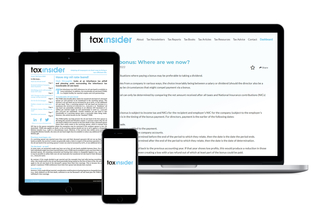 Richard Curtis highlights some capital gains tax planning points that should be considered before the sale of a business.
Richard Curtis highlights some capital gains tax planning points that should be considered before the sale of a business.
----------------------
This is a sample article from our tax saving newsletter - Try Tax Insider today.
---------------------
Generally, capital gains by individuals are taxed at 10% up to the basic rate income tax threshold and 20% for higher or additional rate taxpayers (with an 8% extra charge for disposals of residential property).
However, capital gains tax can be mitigated on the sale of a business, perhaps when the owner retires, by claiming business asset disposal relief (BADR). This was known as entrepreneurs’ relief until 2020, but the rules are substantially the same and qualification for the relief will reduce the 20% charge to 10% for gains of up to £1 million (higher limits applied before 2020).
BADR can be claimed by sole traders and partners disposing of all or part of their business as well as company directors and employees who own at least 5% of the ordinary shares and voting rights in a ‘qualifying company’ when they sell shares or make associated disposals. This article considers some factors that may be relevant in avoiding traps or maximising the relief.
Asset ownership
The business owner may not own all the business assets. For example, one spouse (and I refer also to civil partners) might operate a business from a building that is owned by both spouses. The business owner will potentially be entitled to BADR on the sale of their share, but the other would not.
Consider transferring ownership or bringing the other spouse into the business as a partner or director and shareholder, noting that the conditions for relief must generally be satisfied for at least two years before the disposal and not overlooking any stamp duty or similar considerations.
The £1 million limit
Could the relief be increased? If a spouse is involved in the business but is not a partner or shareholder, could or should they be given a share of the business?
Subject to the two-year ownership period and other conditions, both parties might then each receive a £1 million allowance. Similar considerations may apply to other family members, especially if there is a plan that they should benefit from the eventual sale proceeds. A gift of part of the business or shares to a spouse will generally be on a no gain/no loss basis, so without a capital gains tax (CGT) liability. Gifts to others do not have this benefit, but the gain may be deferred with the relief applying to gifts of business assets. As with all such transactions, do not let the tax considerations outweigh other factors.
Remember that the £1 million allowance is a lifetime rather than an annual amount, but any unused relief would be available for a future qualifying disposal.
Receiving rent
Entrepreneurs may often retain ownership of a business property themselves and charge the business a rent for its use. If there is a mortgage on the property, rent will be needed to obtain a tax deduction for the interest paid, and this can yield National Insurance contributions savings for the owner and income tax or corporation tax savings for the business.
However, it will prejudice BADR, which will be restricted based on the period for which rent has been received since April 2008 and the proportion of the rent received compared to a market rent.
If rent is not charged for a property, it would not be possible to claim capital allowances for any qualifying assets. Depending on the amounts involved and the likely eventual capital gain, more tax relief might be obtained from such allowances over the period of ownership rather than from BADR on disposal.
Get help!
The rules regarding BADR are complex and HMRC will not provide advance clearance, so professional advice on the conditions and how they affect the particular circumstances of each business and its owners is essential.
Note also that there are subtle differences in the rules between director/shareholders and self-employed individuals.
Practical tip
Remember that BADR should not be considered in isolation. Other non-tax issues may be relevant to the transfer of property or business interests to spouses or family members and the effect on other taxes should also be taken into account. For example, the sale of a business asset and the receipt of cash may affect potential inheritance tax liabilities.



